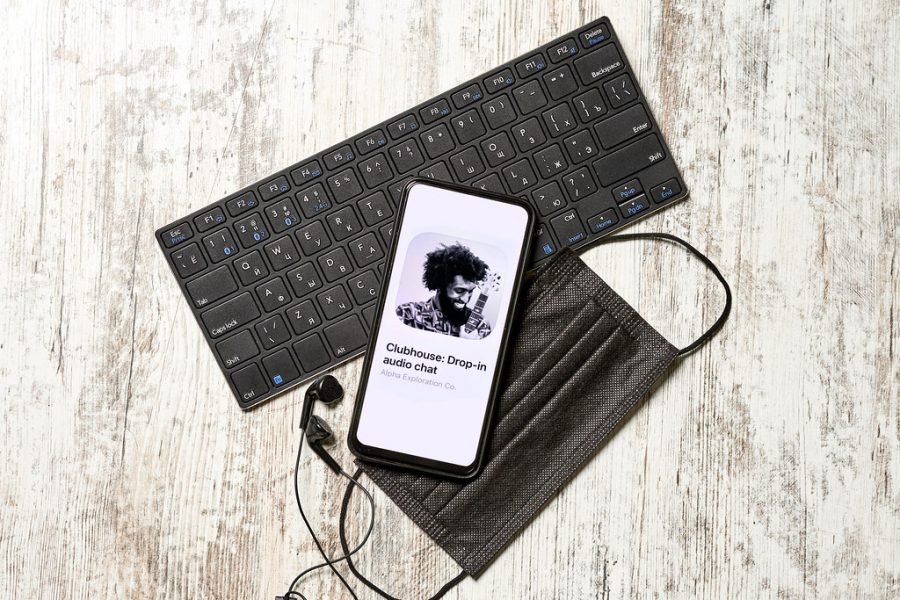Clubhouse, an exclusive audio-chat platform, makes waves in social media community
March 26, 2021
Social media apps exist to connect the public to one another, whether through messaging or sharing posts and videos. For those wishing for a more private experience, Clubhouse is the latest audio chat-based social media app.
Launched in April 2020 by Paul Davison and Rohan Seth, two Stanford University alumni, Clubhouse has grown during the pandemic, which can be attributed to its perfect timing.
First, podcasts have been growing in popularity.
In fact, it has grown so much that “U.S. podcast ad spending will grow 10.4% to $782.0 million” and “surpass $1 billion in 2021 and reach $1.61 billion by 2024, more than double its current level,” according to Business Insider.
Clubhouse feeds into this podcast craze because users can join rooms recommended to them based on their preselected interests and listen to conversations and interviews.
Second, people who struggle with Zoom or other video chat platforms find relief in the audioonly aspect of the app, according to Bloomberg. Hence, the app gives them space to get social interaction with minimal technological barriers.
Still, there is a selective barrier present. Once the app is downloaded, a screen appears saying, “anyone can join with an invite from an existing user — or reserve your username and we’ll text you if you have a friend on the app who can let you in.”
Clubhouse is invite-only, with existing members being able to invite one person each and new recruits being given one invitation when they join the app.
Essentially, the app centers on exclusivity, with its users being some of the wealthiest and wellknown, including Facebook CEO Mark Zuckerberg and actress Tiffany Haddish.
Only those approved by the room’s moderators are allowed to speak, leading to expert-led conversations.
For example, Elon Musk, the founder of Tesla Inc, took to Clubhouse and fielded questions ranging from his thoughts on the pandemic and vaccines to whether living on Mars would actually be feasible. The CEO of Robinhood Markets Inc, Vladimir Tenev, joined the conversation and it quickly turned Musk into an interviewer inquiring about the GameStop situation that rocked the stock market.
More than 5,000 people tuned into the room, and the private and exclusive conversation was even live streamed on YouTube.
This fan frenzy highlights how the app is not just a place for casual conversations. It is meant to be a place for intellectual discussions and debates, and it can even be newsworthy, considering hundreds of journalists listened to Musk’s conversation.
The event, however, did break one of Clubhouse’s rules: no recording.
“The company says the recordings are ‘solely for the purpose’ of investigating an abuse complaint to help determine whether a user should be disciplined on the app,” according to NPR. Once the conversations are screened, the recordings are promptly deleted.
Conversations like Musk’s have been driving the popularity of the app.
The growing demand to join the app has created markets specifically for selling Clubhouse invitations on websites like Reddit, eBay and Craigslist.
The app even has an international reach. “In China, invitations are being sold on Alibaba’s second-hand market place Idle Fish,” according to The Guardian.
Other social media companies have created their own audio-chat platforms to harness some of Clubhouse’s success.
Currently, Twitter is working on Audio Spaces, which is projected to launch this year. Just like Clubhouse, users can enter rooms and verbally discuss topics that interest them.
Discord, a popular platform for gamers, recently announced it will rebrand itself as “your place to talk,” according to the official Discord blog.
The blog also detailed how Discord would adjust its platform.
“We’ve streamlined the new user onboarding experience and added server video so it’s easier than ever to get together. There are new server templates that make it super easy to help your friends create new servers. We’ve fixed hundreds of bugs, increased voice & video capacity by
200%, and continue to invest in reliability and performance as our top priority,” the blog said.
Where Clubhouse thrives on an elitist mentality through exclusivity, Twitter and Discord are focusing on making inclusive platforms that provide the same service.
“We’ve also made the jokes and references within the app less gaming specific to make sure everyone can take part in the fun and make Discord more welcoming,” Discord’s blog said, emphasizing the push on making an app tailored for the public and not select individuals.
Facebook is the latest to be working on an audio-based platform similar to Clubhouse.
“We’ve been connecting people through audio and video technologies for many years and are always exploring new ways to improve that experience for people,” Emilie Haskell, a Facebook spokeswoman, said.
In a time where social interactions are limited and people have taken up new hobbies, the complexity of Clubhouse’s sudden rise to fame can be attributed to its mantra, “Stay quirky.”
“Mindful of the above, let’s have fun and not take ourselves too seriously! Be curious, experiment, share ideas, and take the time to bring joy to someone’s day!” Clubhouse said.








